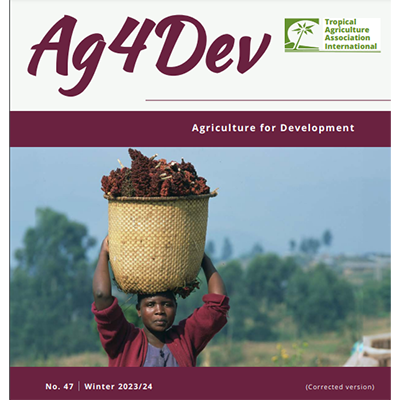
This collaborative article, featured in issue 47 of Ag4dev (Agriculture for Development) journal, underscores the importance of global cooperation and innovative approaches in addressing the complex challenges facing agriculture and food security. Read the full article for comprehensive insights into these critical issues.
Summmary:
As the world strives towards meeting the Sustainable Development Goals (SDGs) by 2030, it faces significant setbacks due to stalled progress and reversals in key indicators. Economic uncertainty, the climate crisis, ongoing conflicts and the lingering impacts of the COVID-19 pandemic compound these challenges. In response, integrated policy approaches across sectors have become imperative.
Efforts to address these multifaceted challenges are underway, with a focus on regions such as the Asia–Pacific, Central Asia and the Near East and North Africa. Strategies including diversifying food sources, promoting agroecology and developing biopesticides are being explored to enhance resilience and sustainability in agriculture.
The Global Forum on Agricultural Research and Innovation (GFAiR) plays a crucial role in coordinating multistakeholder initiatives aimed at fostering resilient, sustainable and equitable agriculture. Through collaboration with regional organizations and other global entities, GFAiR facilitates knowledge-sharing, capacity-building and policy advocacy to address these pressing challenges.
Key points highlighted in the article include:
Global Food and Agricultural Systems Disruptions:
One pressing concern is the disruption of global food and agricultural systems due to various crises, including conflicts like the war in Ukraine and Gaza, the COVID-19 pandemic and climate change. These disruptions have triggered food price hikes, market uncertainties and threats to food security. Strategies are being explored in the Asia–Pacific, Central Asia, Near East and North Africa regions to respond to these challenges through regional and global collaboration.
Role of GFAiR:
The Global Forum on Agricultural Research and Innovation (GFAiR) plays a crucial role in coordinating multistakeholder initiatives aimed at promoting resilient, sustainable and equitable agriculture and serves as a platform for diverse stakeholders to shape the future of agriculture, empowering small-scale producers, including women and youth and fostering inclusive, transparent, and accountable agrifood systems.
GFAiR's Initiatives and Collaborations:
GFAiR's role within the CGIAR system and efforts to strengthen partnerships with stakeholders from the Global South are highlighted. Initiatives such as engagement with national agricultural research systems (NARS) and the establishment of the Global NARS Consortium (GNC) promote South-South cooperation, farmer-led research and innovation.
Addressing Regional Challenges:
Partnerships and collaborations are underscored as vital in supporting research and development within the agriculture sector. The vulnerability of the Near East and North Africa (NENA) region, exacerbated by conflicts and domestic challenges, highlights the urgent need for coordinated efforts. Using Jordan as a case study, the importance of national measures to enhance food security and resilience is explored, along with GFAiR's collaboration with AARINENA to address agricultural challenges in the region.
Conclusion:
In conclusion, a holistic and collaborative approach involving governments, international organizations and local communities is essential to address multifaceted crises affecting agricultural sectors and food systems. GFAiR's growth and initiatives, including the establishment of the Global NARS Consortium, position it to play a significant role in transforming agrifood systems to become more productive, resilient, inclusive and sustainable. Through collective actions and collaborations, countries can find innovative solutions to emerging challenges and build a more resilient future for agriculture.
